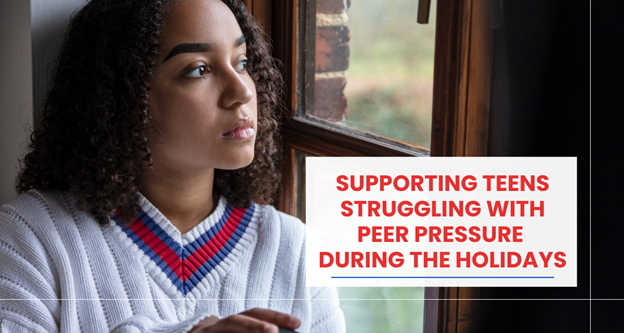The holiday season, while often associated with joy and togetherness, can be especially challenging for teens who feel pressured by their friends to use alcohol, marijuana, or other substances. When a teen chooses to distance themselves from friends who engage in these risky behaviors, it can leave them feeling isolated and lonely at a time when connection is so important.
This sense of loneliness can be particularly intense during the holidays, as many social events revolve around peer groups and gatherings. Without their usual social circle, teens may feel left out or even question their decision to avoid risky situations. It’s crucial for parents to recognize these challenges and provide the support their teens needs to navigate this difficult time.
Parents should be attentive to changes in their teen’s behavior that could indicate they are struggling with loneliness or emotional distress. By noticing these signs, parents can take proactive steps to address their teen’s needs. Parents can keep an eye out for:
• Social withdrawal: A lack of engagement with friends or refusal to participate in social activities
• Mood changes: Increased irritability, sadness, or frequent emotional outbursts
• Loss of interest: A disinterest in hobbies or activities they once enjoyed
• Physical signs of depression: Changes in sleep patterns, appetite, or energy levels
Ways Parents Can Support Their Teen When Struggling With Peer Pressure
Encourage Open Communication
Create a safe space where your teen feels comfortable discussing their feelings. Let them know it’s okay to feel conflicted about their choices and that their decision to avoid peer pressure is a sign of strength.
Include Family in Holiday Activities
Plan inclusive, enjoyable family activities that provide a sense of connection and belonging. From decorating the house to baking holiday treats, outdoor activities or watching favorite movies, these shared experiences can help fill the gap left by their friends.
Facilitate New Connections
Encourage your teen to participate in clubs, sports, or other activities where they can meet peers who share similar values and interests.
Model Healthy Coping Skills
Show your teen how to handle stress and loneliness in positive ways, such as exercising, journaling, learning new hobbies, or spending time with loved ones.
Watch for Signs of Depression
If you notice signs of deeper emotional struggles, such as prolonged sadness, hopelessness, or withdrawal, don’t hesitate to seek professional help. These are delicate times, and the holiday period tends to see a spike in depressive symptoms. Your pediatrician or adolescent primary care physician, a counselor or therapist can provide additional support to help your teen through this tough time. Childmind provides helpful guidance for parents who might be concerned about depression.
Empowering Your Teen
As parents, it’s important to remind your teen that they are not alone in their struggles, and they are loved by you and their family. Highlight their personal strengths, their courage in making healthy choices and reassure them that these decisions will lead to stronger, more positive relationships in the future. Your ongoing support and encouragement can make all the difference in helping your teen feel valued, loved, and capable of overcoming these challenges during the holidays and beyond.
As parents, it’s important to remind your teen that they are not alone in their struggles, and they are loved by you and their family. Highlight their personal strengths, their courage in making healthy choices and reassure them that these decisions will lead to stronger, more positive relationships in the future. Your ongoing support and encouragement can make all the difference in helping your teen feel valued, loved, and capable of overcoming these challenges during the holidays and beyond.
For additional guidance and support during the holidays, visit the NACoA Newsroom for additional blogs about managing the holidays and helping your teens.
